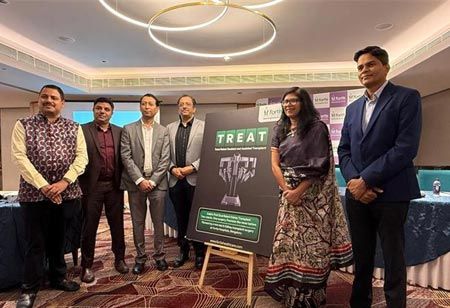India Pharma Outlook Team | Thursday, 26 June 2025

In yet another clinical milestone, Fortis Hospital, Bannerghatta Road, Bengaluru has advanced its robot-aided infrastructure with the launch of the TREAT program (Total Robot Enabled and Assisted Transplant) – a pioneering initiative in robot-assisted kidney transplantation. This state-of-the-art initiative marks a major leap forward in surgical excellence and patient care, especially with its historic milestone: the successful execution of simultaneous robotic surgeries for both donor and recipient — a first-of-its-kind clinical achievement in India.
TREAT combines an Advanced Robotic Surgical Ecosystem with patient-centric protocols to deliver superior clinical outcomes, particularly in Kidney transplant scenarios which are complex. By using two robot-assisted systems simultaneously, one for the donor and one for the recipient, the program minimizes trauma, reduces recovery time and enhances surgical precision to an unprecedented degree.
In India, where most living kidney donors are women who need to manage multiple roles - TREAT is breaking new ground by equally prioritizing donor health by placing equal importance on the wellbeing of donor alongside the recipients. TREAT program is committed to ensuring donor safety and comfort by reducing physical discomfort, shortening hospital stays and enabling a faster return to daily life - all without compromising surgical excellence. TREAT also opens new doors for recipients with co-morbidities those with obesity, prior history of transplants or complex anatomical challenges who previously had limited surgical options. With robotic precision, these patients now have access to life-saving procedures once deemed too risky or unfeasible.
In a recent case, 47-year-old Joachim from Tanzania faced kidney failure due to diabetes, his younger brother Amodeus immediately stepped forward to donate his kidney. As Joachim was suffering from heart ailment and high blood pressure, many hospitals declined to take the risk of the transplant. Seeking a definitive medical solution, the brothers reached out to Fortis Hospital, Bannerghatta Road. Under the TREAT program, surgeons performed a robot-assisted transplant on May 19, 2025. Post-surgery, Amodeus regained mobility within 24 hours, and Joachim’s transplanted kidney showed immediate improvement in its function. The duo is set to return to Tanzania in good health, bearing a story that reflects the power of perseverance and advanced medical care.
Also Read: Fetal Imaging to Cardiac Diagnosis: The Expanding Role of Ultrasound
In another challenging case, 35-year-old Sana from Bijapur endured end-stage kidney failure and an incompatible blood type with her only donor option being her brother Chand. After being turned away by multiple hospitals, they arrived at Fortis Hospital, Bengaluru. Under the TREAT program, Sana underwent antibody-reduction treatment, followed by a complex dual robot-assisted transplant on May 5, 2025. The procedure involved the simultaneous use of two robotic systems, one for Chand’s minimally invasive donor nephrectomy and another for Sana’s high-risk transplant. The surgery demanded precision, coordination and deep expertise and all made possible by TREAT’s advanced capabilities. Sana’s kidney began functioning within days, and both siblings were in good health within a week’s time, thus ensuring a remarkable outcome in a previously deemed inoperable case.
Likewise, when 59-year-old Chowdenahalli developed end-stage kidney disease due to long-standing diabetes and hypertension, his wife Leelavathi, selflessly stepped forward as a donor. Given Kumar’s complex medical history and high surgical risk, several hospitals were hesitant to take on the case. However, under the TREAT program at Fortis Hospital, Bengaluru, the team of doctors embraced the challenge. On May 24, 2025 both underwent simultaneous robot-assisted surgeries, a highly coordinated effort requiring advanced planning, precision and surgical expertise. Thanks to the minimally invasive approach enabled by robot-assisted systems, Leelavathi was discharged in just four days, and Kumar’s kidney function began showing marked improvement soon after surgery. Now recovering together at home, the couple is a living example of the life-changing impact of innovation, expertise, and compassionate care through the TREAT program.
Also Read: Role of Optical Imaging in Early Cancer Detection and Treatment
Dr. Mohan Keshavamurthy, Principal Director – Renal Sciences, Fortis Hospitals, Bengaluru added “The launch of the TREAT program marks a paradigm shift in kidney transplant care. While the spotlight often rests on the recipient, this program places equal emphasis on the donor—particularly in India, where women are the backbone of most donor-recipient families. TREAT enables safe donation from right-sided kidneys, obese donors, kidneys with multiple arteries or anatomical variations, and even those with prior surgeries. By minimizing surgical pain, hospital stay, and emotional stress, TREAT sets a new benchmark in how we care, treat, and heal. With minimal scarring and maximum precision, it restores body image, preserves dignity, and empowers families through a safer, faster, and more compassionate transplant journey.”
Dr Ritu Garg, Chief Growth & Innovation Officer, Fortis Healthcare Ltd, said, “At Fortis, innovation goes beyond technology, it’s about transforming outcomes with empathy and precision. The TREAT program embodies this philosophy by making kidney transplants safer, quicker and accessible even in complex cases. We’re not just improving survival rates; we’re helping patients reclaim their lives. That’s the true impact of TREAT.”